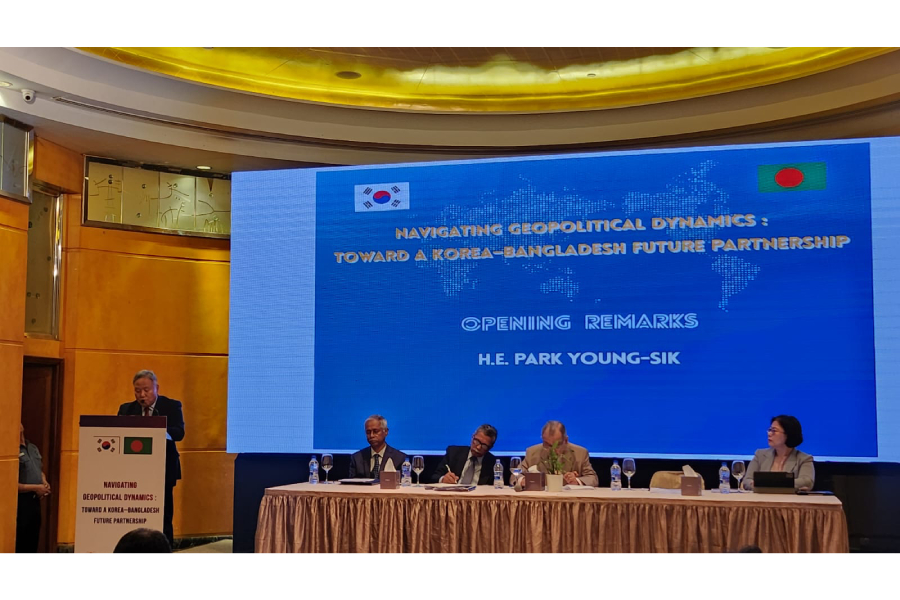Tariff weaponisation poses grave threat to Bangladesh, experts warn

Published :
Updated :

Bangladesh faces an increasingly precarious trade environment as global tariff regimes grow more volatile and geopolitics reshapes global supply chains, economists and policy analysts warned at a seminar in Dhaka on Sunday.
Speaking at the event, titled “Navigating Geopolitical Dynamics: Towards a Korea–Bangladesh Future Partnership” and organised by the Embassy of the Republic of Korea, experts said that the era of predictable, rules-based global trade has given way to a transactional system in which tariffs are routinely deployed as political weapons.
“Tariffs are no longer just economic tools. They have become political instruments,” said Professor Selim Raihan, noting that countries like Bangladesh—heavily dependent on a narrow export basket and a limited number of major markets—are now “uniquely vulnerable” to sudden shifts in trade policy.
Reflecting on the global impact of the Trump-era tariffs, he said the measures “marked a decisive turning point,” pushing countries and companies alike to rethink supply chains.
“What many assumed would be a temporary disruption has evolved into a new normal,” he added, cautioning that even changes in political leadership abroad may not reverse the broader, protectionist logic now embedded in global trade.
Speakers at the seminar pointed to Bangladesh’s own shortcomings in responding to this changing landscape.
Despite being an export-dependent economy, Bangladesh lacks a coherent, forward-looking trade strategy. Structural weaknesses—such as high logistics costs, port inefficiencies, unreliable energy supply, and weak standards compliance—continue to undermine competitiveness.
Political uncertainty and governance challenges, they argued, further complicate long-term policy planning and erode investor confidence.
“For policymakers, the biggest challenge now is convincing themselves to take on the critical reforms required to restore confidence,” Raihan said. “The world has changed; our policies must keep up.”
The seminar, moderated by Ambassador Farook Sobhan and Ambassador Humayun Kabir, brought together Bangladeshi and Korean scholars, diplomats, and trade analysts.
Korean Ambassador Park Young-sik delivered the welcome remarks, emphasising Seoul’s commitment to deepening cooperation with Dhaka.
“Korea has a unique development experience, having transformed from an aid recipient to a donor country,” he said.
“Just as our cooperation in the RMG sector helped drive Bangladesh’s early industrial growth, we intend to expand collaboration in trade, investment, technology, and other key areas.”
He added that the ongoing negotiations over a Comprehensive Economic Partnership Agreement (CEPA) between the two countries would serve as “an important milestone in advancing Korea–Bangladesh relations.”
Speakers argued that Bangladesh can no longer rely on its old formula of low costs, preferential-market access, and scale—a model increasingly under pressure from rising environmental, labour, and sustainability standards that now function as de facto non-tariff barriers.
The global shift from rules-oriented to deal-based engagement, they said, demands that Bangladesh adopt more agile policies, upgrade institutions, and rapidly build capacity to meet evolving standards.
Several experts stressed that partnerships—particularly with technologically advanced economies like Korea—can help Bangladesh break out of its low-value-added export structure.
Korea’s experience in electronics, automobiles, shipbuilding, and high-tech manufacturing offers a blueprint for Bangladesh’s industrial upgrading, said Professor Parves Karim Abbasi.
“Collaboration with Korea can be transformative,” he said, pointing to four areas with immediate potential: industrial capability upgrading, integration into higher-value global and regional value chains, financing and infrastructure development, and skills and institutional capacity building.
Other speakers—including Ambassador Mustafizur Rahman, Dr Song Kyungjin, Dr Lee Soon-cheul and Dr Song Chi-ung—echoed these views.
They underscored that global uncertainty is unlikely to fade soon and that Bangladesh must respond strategically, investing in long-term planning and institutional modernisation.
The message from the seminar was unequivocal: Bangladesh is facing a world where tariffs and trade rules are increasingly politicised, and where external shocks can reverberate quickly through an economy still burdened by domestic constraints.
To navigate this turbulence, experts said, Bangladesh must prioritise reform, deepen international partnerships, and build resilience—before the window of opportunity narrows further.


 For all latest news, follow The Financial Express Google News channel.
For all latest news, follow The Financial Express Google News channel.